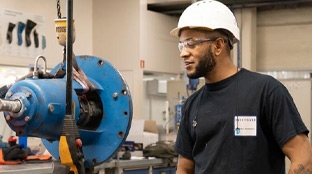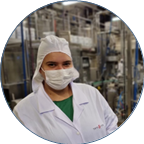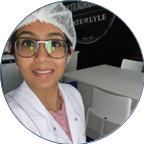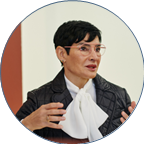Even though women have made tremendous progress towards increasing their participation in higher education, they are still under-represented in the fields of science, technology, engineering and mathematics. The International Day of Women and Girls in Science – celebrated each year on 11 February - is an opportunity to promote full and equal access to, and participation in, science for women and girls.
The United Nations recognizes 11 February as International Day of Women and Girls in Science (IDWGIS) to address the significant gender gap that has persisted in science, technology, engineering and mathematics (STEM) disciplines all over the world. To commemorate International Day of Women and Girls in Science this year, we spoke with women who work at Tate & Lyle in STEM-based roles to discover more about their passion and persistence in their pursuit of science and share their perspectives to inspire others in the field. Keep reading to learn more about their experiences!
Q: Why is access and participation in science for women and girls important?
Marcia Petit, Director – Sensory: “Representation matters. It makes it easier to pursue your passion if you see others who have been successful in the field who look like you. Access is important because sometimes you don’t know what you are good at or what you like until you try. So, both access and participation are critical to help find and encourage the next generation of scientists.”
Veronica Cueva, Senior Vice President – R&D and Solutions Innovation: “It's always been important for me to lift others up, expanding opportunities for woman and girls in STEM. Science, technology, engineering, and mathematics is no longer just a good education tool, it is an economic imperative around the world. Women have an opportunity to enter this field and create a lasting impact.
Q: How have you overcome challenges to access and participation in science as a woman yourself?
Meredith Schneider, Key Account Director: “I overcame challenges by first participating in male-dominated advanced scientific c ourses as an undergraduate student, contributing to research by getting accepted in an undergraduate research program in which women were traditionally underrepresented, and ultimately, by receiving my PhD in a molecular biology based in which I worked with an amazing advisor (a women herself) who helped mentor and promote myself and other women in her research lab and excelling in her field of study!”
Renata Santos, Technical Services Specialist: “In my first job, where I worked mostly with senior men, I had a lot of difficulty finding my own space. This was mainly because I was young, had recently graduated, and am a woman — also because I was not in a place where gender equality was promoted at that time. I overcame this challenge, with great humility and transparency in my work, respecting those with more experience and demonstrating my value. Every day, I gained more confidence and knowledge through the desire to learn from the people who had been in the profession for years. It certainly wasn't easy, and rightly so, but many women have gone through this. Today, I increasingly seek to be a welcoming person and look for companies that have the same purpose and values as mine.
Q: What drives your passion for a science-driven career?
Sanaz Ghorbani, Technical Services - Bakery: “For me it’s about the opportunity to explore the unknown, contribute to groundbreaking discoveries, and address real-world challenges. Science-driven roles provide a platform for continuous learning, innovation, and making a positive impact on society. Being part of a scientific community allows me to help shape the future, engage in problem-solving, and experience the excitement of unraveling the mysteries of the universe. Passion for a science-driven career brings fulfillment, personal growth, and the chance to leave a lasting legacy through meaningful contributions to knowledge and progress.”
Tamara Santos, Senior Technical Service Specialist: “I am passionate about my career because it is a way of contributing significantly to society, both for consumers and industry professionals, exchanging knowledge that is extremely important. For instance, food safety ensures that products are safe, nutritious and meet quality standards, promoting public health, n utritional innovation helps develop healthier foods, with fewer additives and more nutrient density to contribute to improving the population's diet and health by offering options for different tastes and needs, enriching people's eating experience. Thinking not only about the food but the cultivation and its source helps create sustainable practices that reduce environmental impact, promoting social and environmental responsibility in the industry.
Q: Why do you believe science is so critical to innovation today and for the future of food?
Venitia Sequeira, Category Development Manager: “Science is the foundation of food innovation, providing the knowledge and tools needed to address global challenges like sustainability, health, and resource scarcity. It enables us to develop cutting-edge solutions, from alternative food sources to sustainable production methods, ensuring a resilient and nourishing future for all.
Elise Gavin, Senior Research Scientist – Sensory: “From the agricultural revolution to the industrial revolution, science has had an incalculable impact on the survival and betterment of the human race. Today, science allows us to find efficiencies in water-use in food processing, enhanced food safety for consumer products, and identification of more healthy foods for all…and what could be considered a food revolution.”
Q: How has science been used to make a positive impact on society and what has that looked like at Tate & Lyle?
Ajanta Mazumdar, Graduate Technical Services Specialist: “Fortification of food is one of the great achievements of food science in my eyes. It has been a key enabler to keeping millions of disorders and physical conditions at bay and can have a huge impact in the betterment of public health overall. For example, Tate & Lyle’s introduction of Promitor® Soluble Fibre for fortifying food is a big leap in science-driven ingredient innovation and can help bridge the fibre gap through reformulation of everyday food products, like cereal bars or yoghurts.”
Melissa Kaczmarczyk, Principal Scientist – Nutrition: “Science has been used to research and develop low and no-calorie sweetener ingredients that can withstand various food processing conditions, allowing for the reduction of sugar in commonly consumed foods. Further, scientific research into potential health benefits, such as one of our latest studies on LNCS and the impact to gut microbiota, uncovers opportunities to improve the nutritional value in food products. This helps people make healthier and tastier choices when they eat and drink every day and is part of the lasting impact we make by living our purpose of Transforming Lives through the Science of Food.
Victoria Spadaro-Grant, President - Innovation & Commercial Development: “There are so many examples that it is hard to single out one of them. I can honestly say that the ingredient science, the application know-how, the nutrition expertise and the regulatory credentials that go in to every single customer solution that Tate & Lyle puts out in the markets, is led by the desire to make a positive impact on society. Our teams at Tate & Lyle are the best at this because of the diversity of backgrounds and gender that we represent across our science and technical community. They are, indeed, solving customer challenges with their great expertise and the scientific evidence of our ingredients every day.”
Q: What is the most memorable science-driven “ah-ha” moment that you have experienced while working at Tate & Lyle or during your career overall?
Megan Bishof, Commercial Development Director: “When I was working in Innovation on Allulose and Reb M with bioconversion technology, I learned so much from all of the talented research scientists, engineers, and enzyme producers on the project as it was truly groundbreaking technology. For Reb M, it was a more sustainable and cost-effective way to make Reb M and perfectly fit the needs of our customer and their consumer. For allulose, it was setting the groundwork for the pivotal FDA submission on this type of sweetener, which had never been done before. It took a massive team of cross-collaboration that everyone should be very proud of.
Marietta Sayegh, Nutrition Business Partner: One significant lightbulb moment for me was understanding gender bias in clinical trials. It hit me that most trials recruited only men, neglecting important aspects of women's health. I discovered that, as a consequence, many studies out there had predominantly focused on men, with their findings being generalised to women, overlooking potential gender-specific effects. This realisation drove me to focus my PhD on nutrition and women's health, aiming to contribute to a more holistic understanding of the field.
At Tate & Lyle, everything we do starts with science. We know diversity drives better, more innovative solutions and are committed to making a positive impact on society. That’s why we’re working towards becoming more equitable, diverse and inclusive and proud of our own women in STEM, who accelerate innovation and inclusivity in ways that make a better way forward for all of us.
Jenny Siegfield, Scientist – Global Ingredient Technology: “Passion is not tied to gender. Every individual is unique. Just as a delicious dish is not made up of one type of ingredient, it only becomes something great thanks to different ingredients. As women, we bring diversity to research with different talents and create new perspectives for science and technology that helps benefit everyone.”

Equity, Diversity & Inclusion
We're committed to all of our employees being seen, heard and valued, and our teams reflecting the local communities we serve. Learn more about our approach and commitments to Equity, Diversity & Inclusion globally.













